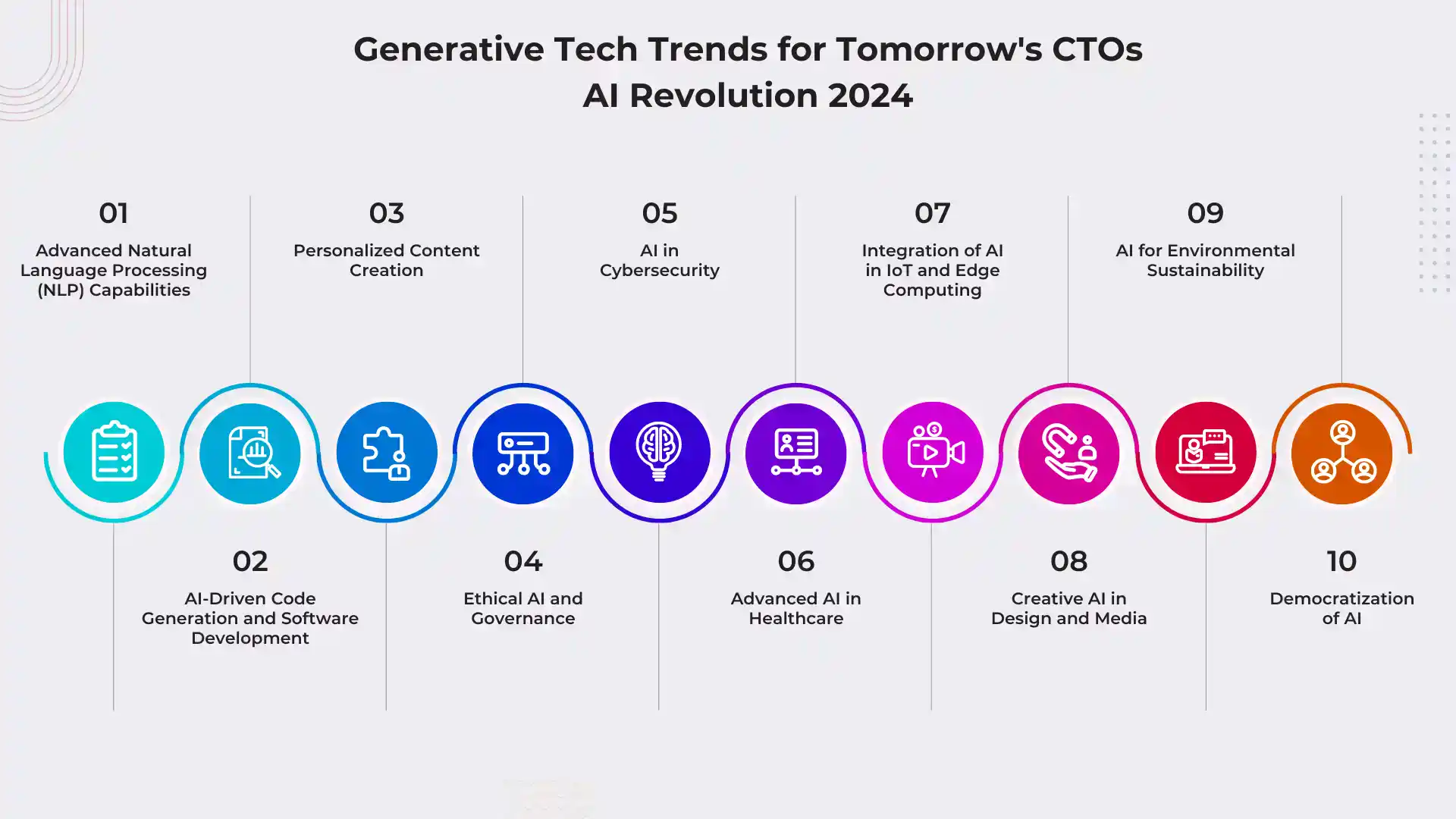Table of Contents
As the AI Revolution 2024 approaches, the dynamic landscape of generative AI is swiftly evolving, offering CTOs fresh opportunities and challenges. This blog delves into pivotal trends in generative AI that CTOs must track to maintain a leading edge in the technology race.
AI Revolution 2024: Here are 10 Tech Trends To Follow

1. Unveiling Advanced Natural Language Processing (NLP) Capabilities
Generative AI is set to take NLP to new heights in AI Revolution 2024. Advanced models and tech trends are expected to understand and generate human language with unprecedented accuracy, enabling more nuanced and context-aware interactions. This leap in NLP will be pivotal for businesses in customer service, content creation, and beyond. CTOs should look at investing in these technologies to enhance customer engagement and operational efficiency.
2. AI-Driven Code Generation and Software Development
AI’s role in software development is expanding. In AI Revolution 2024, we anticipate AI tools that can generate code, debug, and even suggest architectural improvements. This will significantly reduce development time and open new avenues for rapid prototyping. CTOs should consider how to integrate these tools into their development pipelines to stay competitive.
3. Personalized Content Creation
Generative AI will allow for the creation of highly personalized content at scale. This includes customized marketing materials, tailored educational content, and personalized entertainment experiences. This tech trend offers a unique opportunity for businesses to connect with their audience on a deeper level. CTOs should explore ways to leverage this technology to enhance brand loyalty and customer satisfaction.
4. Ethical AI and Governance
As AI becomes more capable, ethical considerations and governance will become increasingly important. In AI Revolution 2024, expect a rise in tools and frameworks for ensuring ethical AI deployment. This includes bias detection, fairness audits, and transparent AI operations. CTOs must prioritize ethical AI practices to maintain trust and compliance.
5. AI in Cybersecurity
Generative AI will play a critical role in cybersecurity, with systems capable of predicting and responding to threats in real-time. These AI-driven security solutions will be essential for protecting against sophisticated cyber attacks. CTOs should invest in AI-based cybersecurity tools to safeguard their digital assets.
6. Advanced AI in Healthcare
The healthcare sector will see significant advancements with AI capable of generating predictive models for patient care and drug discovery. This will revolutionize how healthcare providers diagnose and treat illnesses. CTOs in the healthcare sector should focus on how generative AI can improve patient outcomes and operational efficiency.
7. Integration of AI in IoT and Edge Computing
Generative AI will integrate more with IoT and edge computing, enabling smarter and more autonomous devices. This integration will be crucial in manufacturing, automotive, and smart cities. CTOs should explore opportunities to incorporate AI into their IoT strategies for enhanced performance and data insights.
8. Creative AI in Design and Media
AI will increasingly assist in creative processes, including graphic design, music production, and video editing. This will empower creators with new tools for innovation while also posing challenges to intellectual property and originality. CTOs in creative industries need to balance the use of AI tools with the maintenance of creative integrity.
9. AI for Environmental Sustainability
Generative AI will contribute to environmental sustainability efforts, such as optimizing energy usage and reducing waste. This trend offers CTOs a chance to align their AI strategies with corporate sustainability goals, creating a positive impact on the environment.
10. Democratization of AI
Finally, the democratization of AI tools will continue, making powerful AI capabilities accessible to a broader range of businesses and individuals. This trend will level the playing field, allowing smaller businesses to compete with larger corporations. CTOs should look at how they can leverage these accessible tools to foster innovation within their organizations.
Conclusion
The year promises AI Revolution 2024 to be a transformative period for generative AI. At HyScaler, we stay informed and are adaptable to harness these trends effectively. By embracing these developments, we aim to drive innovation, enhance operational efficiency, and create more engaging experiences for our customers. The future of AI is bright, and the opportunities it presents are boundless.